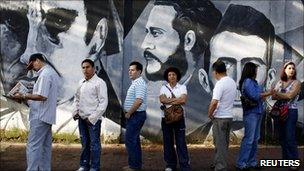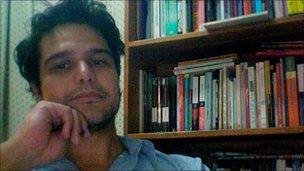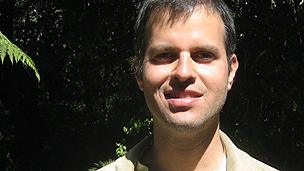Venezuelans reflect on election results
- Published

The Venezuelan opposition has made significant gains in parliamentary elections.
President Hugo Chavez's United Socialist Party (PSUV) still won a majority of seats in Sunday's poll, but will be unable to pass major legislation unaided.
Here, Venezuelans share their views on the election results.
Flor Amarista, clerk, Caracas
I am happy with the results because they show that Venezuela is a truly participatory democracy. President Hugo Chavez has convinced the opposition to participate in the Assembly instead of staying on the sidelines like they did in the past elections.
The opposition are now unhappy with the results and say that they had more votes - but this was not a presidential election but a legislative one. Also, a lot of people didn't vote, which is something the president should look into it. But I'm sure participation would have been higher if this were a presidential election.
The opposition has the people necessary to build a strong opposition but has always chosen the path of violence, and that is not the right way to build a country.
Their hatred for Mr Chavez has made them blind to the positive way in which Venezuela is changing. The poorer people now participate, talk, make decisions and have taken the path to democracy.
I am not part of the government's party but I am very happy with the way the country is being run. I lived through the previous governments and the 11 years that Chavez has been in government and can say that he really worries about the people. He has been doing a lot about education and health. There is a lot of bureaucracy and corruption, but that has been happening for the last 40 years and it is very difficult to fight against it.
Carlos Morreo, university lecturer, Caracas

Carlos Morreo opted to mix his votes strategically
I am surprised with the result. I didn't think the opposition would get the amount of seats that they did.
I support the government but I'm not pleased with Chavez's record of late and his failure to communicate and discuss policies.
So after much thought, I strategically mixed my votes in order to send a message. As a citizen living in East Caracas, I had five votes to cast - three for the National Assembly, and two for the regional Latin American Parliament. I used two of my five votes to vote for a party that recently broke away from the Chavez alliance.
It was great to see so many Venezuelans of all ages go to the polls. We have touch-screen voting machines where we have to cast our votes in six minutes - if we run out of time, whatever is entered on the screen would be it.
Although I would certainly find it hard to vote for the opposition parties, I do sincerely welcome their inclusion in the new National Assembly.
I believe their presence and competition with the PSUV-PCV (Communist Party of Venezuela) in parliament can only make things better.
I think Chavez's style of politics has to change. I don't think he will be able to see eye-to-eye with the opposition, but he will have to work with them in order to create policies and legislation for the future.
Adriana, student, Caracas
I am currently living abroad, studying for my MBA in France. But I came back to Venezuela on Friday for a few days just to vote, and I voted against Chavez.
All Venezuelans have to realise how important it is for us to vote and show the world how Chavez is losing popularity every second.
I am from Caracas, which used to be a safe place but nowadays it is becoming more and more unsafe to live here.
Two guys have tried breaking in to my house, and six people I know have been kidnapped. It is very unsafe to go out.
Any person who lives in Venezuela and has seen their salary reduced due to inflation, or had a family member killed, kidnapped, or robbed, will react to Chavez's unpopularity.
Violence, inflation, and insecurity have become the rule.
There is a brain drain in Venezuela and many people have left the country, but still the best way to try to change things is by voting.
There was an unfair distribution of seats by the national electorate council, so the opposition will have little chance of gaining a majority.
But I think the opposition is becoming stronger - opposition parties got together to put up one candidate against Chavez.
The opposition's main focus was getting Chavez out of power. But there needs to be a focus on what it wants to achieve afterwards and what it can offer the people.
The presidential elections in 2012 will be very important. To have the majority of the vote would be the key. But I think Chavez would do anything to remain in power.
Jesus Gutierrez, teacher, Caracas

Jesus says the results reflect the political reality in Venezuela
I voted for an opposition party candidate based on the performance of the mayor of our borough, who is a member of the governing party. I wanted to elect a member of parliament who would do more to support laws for the development of my region.
I think the results across the country fairly reflect the political reality here.
President Chavez is still very popular, especially among the majority of poorer people in rural areas and those who live in shanty towns. Those people depend on the social programmes and job opportunities provided by the government.
But the government is very unpopular in most of the big cities and urban areas because of the social problems we face such as unemployment, overpopulation, high crime rate and a rising cost of living.
The performance by some of United Socialist Party governors has not been as efficient as some of their supporters expected, which has created a lot of disappointment led to them being punished at the election.
The new members of the parliament must now work harder and more efficiently to make laws that contribute to the economic and social development of the country. This is the challenge for the opposition parties and the government.
The opposition parties will now be under strong pressure to demonstrate that they can make a difference in this parliament over the next two years. They will need to do this to have any chance of doing well in the 2012 presidential elections against Mr Chavez.
- Published27 September 2010
- Published27 September 2010